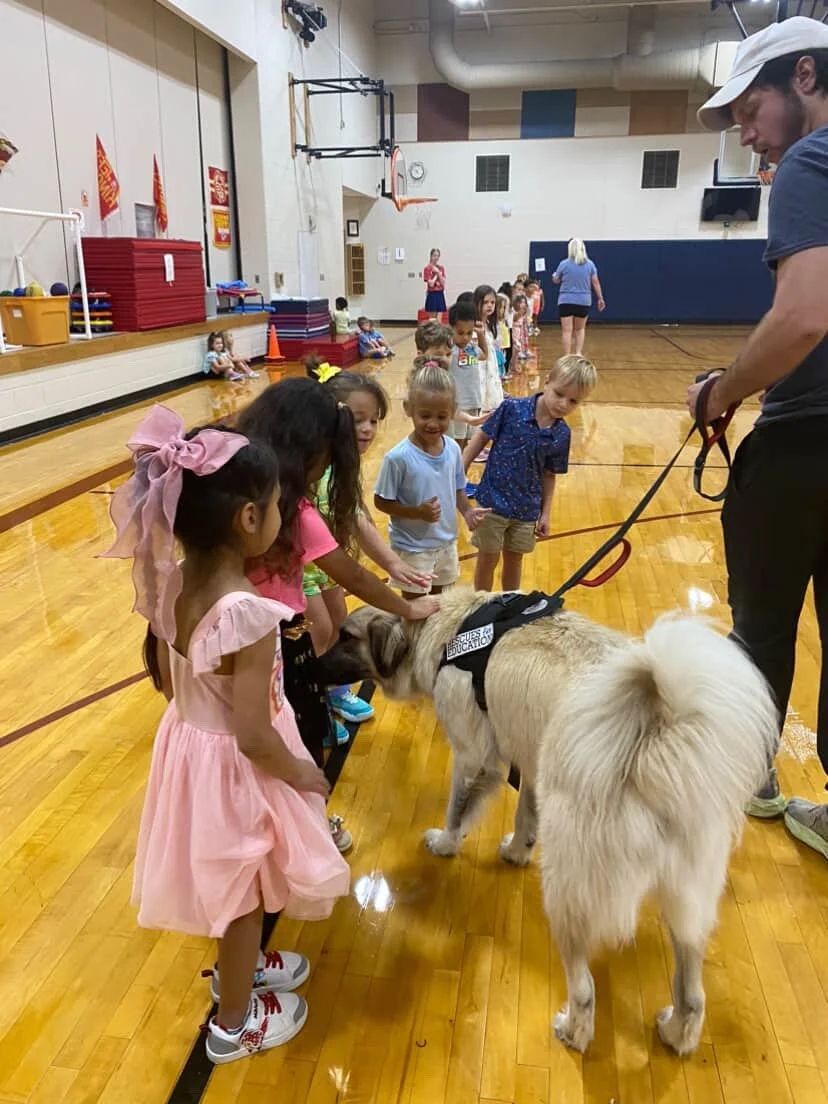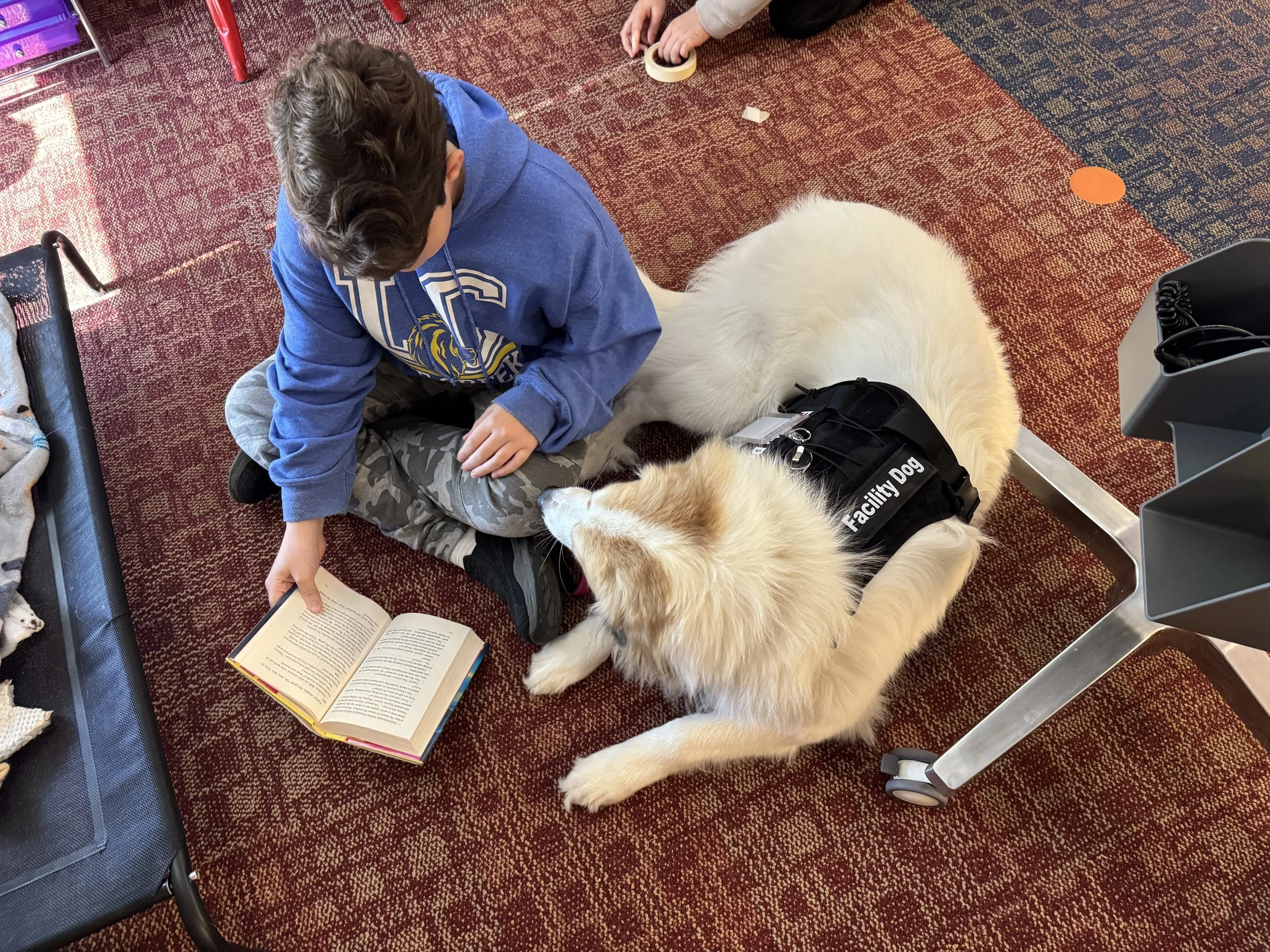What are the benefits of having a facility dog?
Resources to Get Informed
Therapy Dogs in Educational Settings
This research identifies factors that facilitate or hinder the successful implementation of therapy dog programs in schools. It emphasizes the importance of program flexibility, whole-school support, communication, training, and consideration for the dogs' welfare.
Animal-Assisted Education
Research on the Positive Impact of Dogs on Behavioral and Emotional Outcomes of Elementary School Students: This study provides empirical evidence on the positive effects of animal-assisted education, particularly in enhancing motivation and engagement among students, which are crucial for learning and social development.
Dogs at School
A Quantitative Analysis of Parental Perceptions of Canine-Assisted Activities in Schools Mediated by Child Anxiety Score and Use Case: This research examines parental perceptions of canine-assisted activities in schools, highlighting how such programs can reduce student anxiety and improve behavioral outcomes.
Animal-Assisted Interventions With Dogs in Special Education—A Systematic Review
This review of 18 studies highlights how dog-assisted interventions can support students with special needs by improving emotional regulation, social skills, and motivation. Dogs help reduce stress and encourage communication, especially in students who struggle with interpersonal interactions.
Measuring the Effects of Reading Assistance Dogs on Reading Ability and Attitudes in Elementary Schoolchildren
This study explored the impact of therapy dogs on young learners' reading skills and attitudes. Conducted by researchers from Tufts Cummings School of Veterinary Medicine, the study involved elementary school students participating in reading sessions with therapy dogs. The results indicated that students who read to dogs exhibited improvements in reading ability and developed more positive attitudes toward reading. This highlights the potential of facility dogs to enhance literacy skills and foster a love for reading among children.
A Social-Emotional Learning Program for Suicide Prevention through Animal-Assisted Intervention
A pilot study evaluated the OverCome-AAI program, integrating animal-assisted interventions to prevent suicidal behavior among adolescents aged 14 to 17 in residential care. Post-intervention, participants showed significant reductions in suicidal thoughts, plans, and non-suicidal self-harm, alongside increased willingness to seek help. Mental pain intensity decreased.
Publication of Largest-Ever Study on Pets in the Classroom Indicates Positive Impact on Academic and Social Behavior
A 2019 study involving 591 third- and fourth-grade students across 19 U.S. schools found that classrooms with pets saw significant improvements in students' social skills, including communication, cooperation, and empathy. Teachers also reported better academic performance and fewer behavioral issues. This research underscores the value of integrating pets into educational settings to enhance student development.
Looking for a facility dog?
Frequently Asked Questions
-
Therapy dogs receive basic obedience training and visit schools briefly to comfort students. Facility dogs undergo advanced, task-specific training, allowing them to work full days in schools alongside staff. Emotional support dogs lack formal training, limiting their ability to be in schools all day or handle busy, unpredictable environments.
-
It’s more ethical and sustainable than breeding specifically for roles, and it highlights the value in adopting capable, loving dogs who might otherwise be overlooked. A dog’s true temperament usually emerges around one year old—many rescues are past this stage, making it easier and safer to select those best suited for school environments.
-
Schools are unpredictable environments filled with loud noises, sudden movements, and constant activity. While personal pets may be loving, most aren’t equipped to handle that stress. Purchasing a facility dog from a highly trained trainer ensures the dog is specifically prepared to remain calm, focused, and reliable in these dynamic settings.








